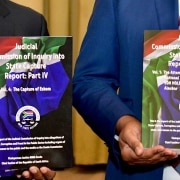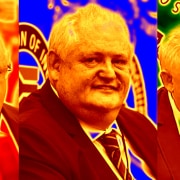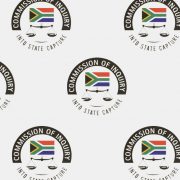|
Getting your Trinity Audio player ready...
|
By Valencia Talane
First published in The Sunday Independent
Tuesday 20 August is the one-year anniversary of the public hearings of the Zondo Commission of Inquiry into State Capture. It had a relatively slow start, gaining momentum over the course of this year. The commission has heard evidence of alleged interference and corruption in state-owned entities and government departments alike, the impact of such corruption on public officials mandated to uphold the principles of the Constitution, and the involvement of private sector companies in the mayhem.
Testimony began last August 21 with the perspective-setting account of acting chief procurement officer Ndleleni Mathebula, who placed the state’s public procurement budget at R800-billion per annum. He was the first witness called, and a vital point of departure that placed into context the massive amounts that would over the next year emerge as having left the public purse, allegedly drained out of this budget by one entity or other in support of a state capture project.
Each of the state-owned entities that would be probed by evidence leaders in the year that followed claimed to have lost millions of rands in irregular contracts that have largely gone unprobed. Financially troubled Eskom was bending over backwards to accommodate Gupta-owned Tegeta as a coal supplier in a R3-billion contract, the commission heard, while Transnet allegedly paid Regiments Capital over R200-million during its R54-billion locomotives project for work not done.
Arms manufacturer Denel’s longtime supplier was allegedly taken over by the Guptas to help control the company’s procurement programme, which would later include the establishment of Denel Asia, the subject of an unpleasant legal tug of war between South Africa and India due to bureaucratic red tape.
The next three witnesses who followed Mathebula would all implicate former president Jacob Zuma, directly or indirectly, in interference of their public offices. Former Government Communication and Information System (GCIS) head Themba Maseko and former ANC MP Vytjie Mentor both said Zuma wanted them to do favours for the Gupta family, while former deputy finance minister Mcebisi Jonas claimed Ajay Gupta offered him a large bribe and a promotion, with Zuma’s son Duduzane present in the room.
Although Zuma did not read this evidence as implicating him, the Guptas responded to it by applying to the commission for permission to cross-examine the witnesses. The catch was that they would only do it from their new home in Dubai, United Arab Emirates, for fear of arrest in relation to a separate matter, the Estina dairy farm project in the Free State, should they return to South Africa.
Commission chairperson Deputy Chief Justice Raymond Zondo denied the application, falling short of accusing the family of taking the commission for a joke. Their application would be reconsidered, he said, if they in turn reconsidered their position.
The months that followed saw evidence taking shape that fed into the narrative of Zuma being at the centre of state capture. Former ministers Barbara Hogan and Ngoako Ramatlhodi in November, as well as then finance minister Nhlanhla Nene a month before that in October, gave their accounts of Zuma’s alleged interference in their work. Hogan and Ramatlhodi were ministers of public enterprises and mineral resources, respectively, albeit under different Zuma terms.
They revealed Zuma tried to influence decisions they had to make in their portfolios, regarding board appointments in Hogan’s case, and industry policy in Ramatlhodi’s. When they would not, they were fired.
Nene resigned from his post soon after his appearance, after conceding that he had previously lied about his engagements with the Guptas while in office during his first stint as minister.
At the centre of all their evidence, however, was the suggestion that Zuma actively took part in undermining the values of his own office, putting the public resources at the disposal of his friends, at the expense of the country. The inference was that where the Guptas wanted influence and power, Zuma made it happen.
Although Mathebula’s testimony is now a distant memory in the greater scheme of things given the evidence that the commission has come to hear up to now, its first-year anniversary, it remains important for context.
When testifying in January this year, former chief operating office of Bosasa (now Africa Global Operations) Angelo Agrizzi revealed that his former boss, chief Gavin Watson, likened Zuma to a puppet president through whom the company could wield power and avoid prosecution for its involvement in tender corruption. Since the early 2000s, Bosasa has held lucrative contracts with the Airports Company of South Africa and the Department of Correctional Services (DCS) that totalled over R1-billion annually.
The DCS contracts were only shut down earlier this year, following Agrizzi’s evidence. Former DCS national commissioner Linda Mti was instrumental in securing the contracts, said Agrizzi, as he was in keeping public prosecutors at bay, when the Special Investigating Unit found evidence of corruption in the contracts.
While these arrangements were going on, Bosasa was also running a large bribery scheme that included political heads of departments, ministers and officials alike, whose silence was bought at a hefty price. One such official was former justice department COO Khotso de Wee, who at the time of Agrizzi’s testimony was secretary of the Zondo commission. Placing De Wee on special leave following this revelation, Zondo said in a statement the commission took the allegations seriously. Many witnesses shared how they lost or left public sector positions in favour of retaining their principles.
While some walked away without so much as a noise, others who tried to fight for what they saw as justice were often disillusioned by the lack of interest from the criminal justice system. Maseko claimed the Hawks sent him from pillar to post when he tried to report threats by Ajay Gupta, that he would call on Zuma to intervene when Maseko refused him access to the GCIS budget of R600-million for the New Age newspaper in 2010. Mentor’s claim was that senior Hawks officials sabotaged her statement to exclude the implication of Zuma.
Putting the climate in which these failures to hold implicated individuals to account into context, former national director of public prosecutions Mxolisi Nxasana, former Independent Police Investigative Directorate head Robert McBride and former Hawks head in KwaZulu-Natal Johan Booysen all gave chilling accounts of the patronage system that collapsed their areas of work. It was this patronage that blocked all efforts to investigate in some instances, or prosecute those against whom there was evidence of corruption in others.
Nxasana’s testimony was cut short when the legal representative of his former deputy Nomgcobo Jiba interjected to claim prejudice against his client. The other two, however, spent days telling how they were removed from their positions in the interest of protecting colleagues who seemed sympathetic to capture.
McBride’s description of a “silent coup” that characterised the criminal justice system showed that there was an attack on anti-corruption bodies, which included the “removal of their heads by either suspension or spurious disciplinary actions”, one of which was his own.
There have been calls for Zondo to release one or more interim reports on the work of the commission, to give insight on its findings so far.
Although this has not happened, anyone following the proceedings in Parktown can easily distinguish a pattern in the evidence led so far, that calls for recommendations on delegations of authority within government structures, to develop a greater sense of scrutiny and monitoring of implementation of strategic ideas envisaged for service delivery.
Talane is a writer for Corruption Watch.






